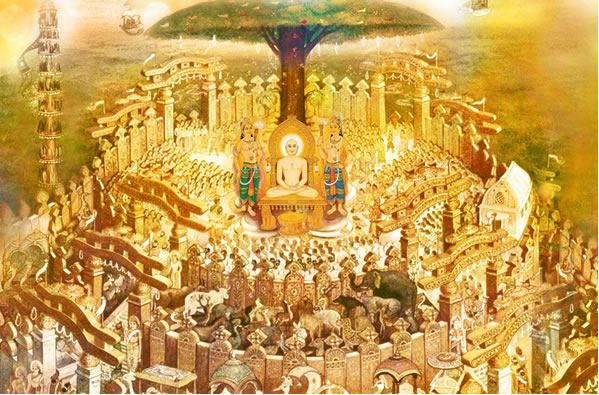
Bhagwan Mahavir

Lord Mahavir was a prince whose childhood name was Vardhaman. The Digambar tradition has it that Lord Mahavir was born in the year 615 BC, although the Shwetambaras believe that he was born in 599 BC. Both sects however agree that he was the son of King Siddhartha and Queen Trishaladevi. It is said that his mother Trishaladevi had 16 auspicious dreams before the child was born (14 according to the Shwetambaras). Astrologers interpreting these dreams stated that the child would be either an emperor or a Tirthankar.
As the son of a king, he had many worldly pleasures, comforts and services at his command. Once, during his childhood, while playing he brought under control a terrifying serpent. Consequently and as a symbolof this feat of bravery, he was given the title of Lord Mahavir and Vira-natha.
At the age of thirty, he left his family and the royal household, gave up his worldly possessions, and became a monk in the search of a solution to eliminate pain, sorrow, and suffering from life of all beings.
Relinquishing not just his royal ornaments but also his clothes, Lord Mahavir left his palace and retired to the park, Jnatrkhanda-vana, close to Kundapura. He pulled out his hair by his hands, fastedfor three days and then plunged himself into meditation. After some time, he started touring various parts of the country. He strictly followed Ahimsa, adhering to the principles of not depriving others of even a blade of grass belonging to them; not lying; not entertaining any sexual appetite, even in mind; and not possessing any worldly goods. Along with the practice of his five great vows he got himself habituated to enduring with peace and patience all kinds of physical and mental tortures, including hunger, thirst, cold, heat, insect bites, etc., a practise known as parisaha.
Lord Mahavir spent the majority of the following twelve and a half years in deep silence and meditation to conquer his desires, feelings, and attachments; and to eradicate all four Ghati Karma. He carefully avoided harming other living beings including animals, birds, insects, and plants. He also went without food for long periods of time. He remained calm and peaceful against all unbearable hardships. During this period, his spiritual powers developed fully and he realised perfect perception, perfect knowledge, perfect conduct, unlimited energy, and unobstructed bliss. This realisation is known as Keval-jnan or the perfect enlightenment.

After attaining omniscience, Lord Mahavir came to Rajgriha (Rajgir), the capital of the erstwhile kingdom of Magadha and took a worthy seat on MountVipulacala. Here he propounded the basic principles of Jain dharma, the anu-vrata for the laity and maha-vartas for the monks, whereby the ideal of a blissful life can be reached.
Lord Mahavir spent the next thirty years travelling barefoot throughout India, preaching the eternal truth he had realised. The ultimate objective of his teaching is how one can attain total freedom from the cycle of birth, life, pain, misery, and death; and achieve the permanently blissful state of one’s self. This is also known as liberation, nirvan or absolute freedom, moksha.
At the age of 72 (in 527 BC), Lord Mahavir attained nirvan and his purified soul left his body and achieved complete liberation. He became a Siddha: a pure consciousness, a liberated soul, living forever in a state of complete bliss. On the evening of his nirvan, people spiritually celebrated the Festival of Lights (Dipavali) in his honour. This is also the last day of the Jain calendar year.
Lord Mahavir’s message of nonviolence (ahimsa), truth (satya), non stealing (achaurya), celibacy (brahmacharya) and non-possession (aparigraha) is full of universal compassion. He made religion simple and natural, free from elaborate rituals. His teachings reflect the internal beauty and harmony of the soul. Lord Mahavir taught the idea of supremacy of human life and stressed the importance of a positive attitude towards life.
Lord Mahavir said that, “A living body is not merely an integration of limbs and flesh but it is the abode of the soul which potentially has infinite perception (Anantdarshana), infinite knowledge (Anantjnana), infinite power (Anantvirya), and infinite bliss (Anantsukha).”
He emphasised that all-living beings, irrespective of their size, shape, form, and spiritual development or lack of thereof, are equal and we should love and respect them. In this way, he preached universal love.
Lord Mahavir taught that the true nature of reality is timeless, with no beginning or end and rejected the concept of God as a creator, a protector, and a destroye of the universe. He also taught that worshiping heavenly gods and goddesses, as a means of material gain and personal benefits is contrary to the path of liberation.
When asked about religion from a realistic point of view, Lord Mahavir said, “Realistic religion consists of four parts: 1) equality of all living beings, 2) every living soul has the right to put self-effort to improve itself and should not to be stripped of that right, 3) no one should rule over another living being, and 4) all situations should be viewed with equanimity - without like or dislike.”Even if one adopts only one of these four tenants, the other three will automatically be adopted.





